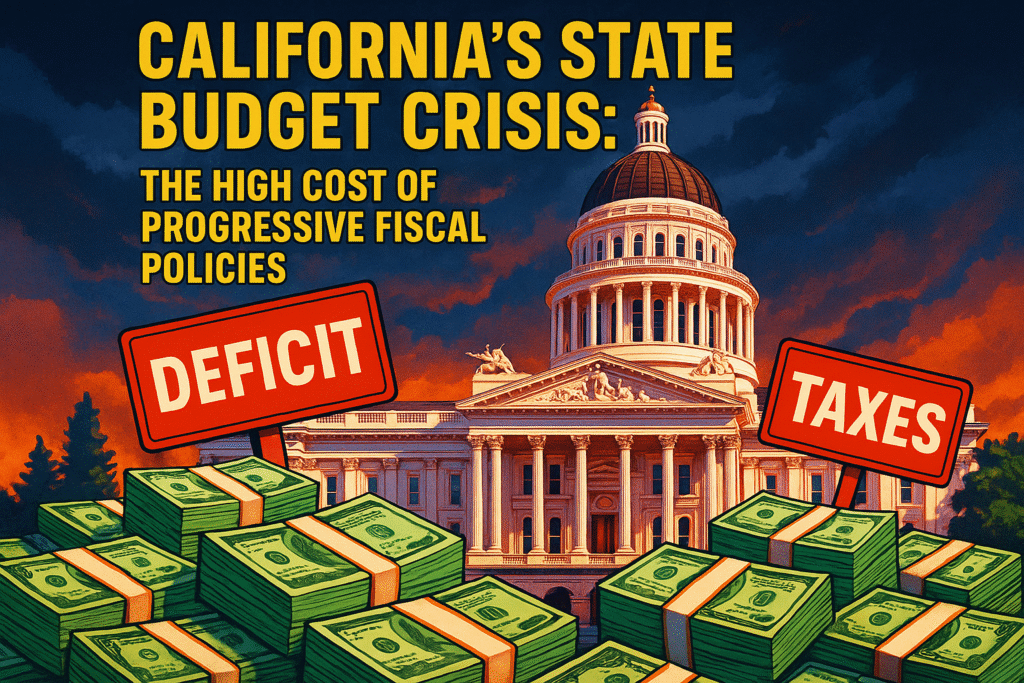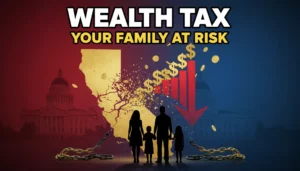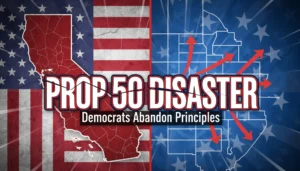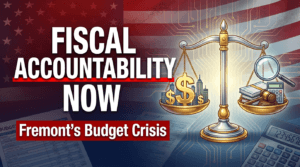California’s State Budget Crisis: The High Cost of Progressive Fiscal Policies

California, once the epitome of American opportunity and innovation, now finds itself mired in a budget crisis of its own making. For years, progressive policymakers have promoted an agenda of ever-increasing government spending, high taxes, and costly social programs. The result? A ballooning deficit, battered businesses, and a flight of residents and capital from the Golden State. From a conservative perspective, California’s fiscal woes serve as a cautionary tale for the rest of the nation—and a call to return to responsible governance.
The Anatomy of a Budget Crisis
California’s 2024 budget negotiations have been dominated by a staggering deficit, projected at over $45 billion. Despite a decade-long economic boom and record tax revenues, Sacramento’s spending habits have far outpaced its income. The state’s progressive leadership, emboldened by a supermajority, continues to prioritize expansive welfare programs, aggressive climate initiatives, and costly education reforms—often at the expense of fiscal sustainability.
The sheer size of the deficit is alarming, but what’s more troubling is the mindset that created it. California’s approach to budgeting seems to operate on the assumption that good economic times will last forever, and that taxpayers will endlessly tolerate ever-higher rates. But as the latest exodus of businesses and residents shows, there are limits to what even California can bear.
The Tax Burden Is Driving People Away
A key driver of California’s budgetary problems is its reliance on a shrinking tax base. The state boasts some of the highest personal income and corporate tax rates in the nation. While this has helped fill state coffers during boom years, it also creates a volatile revenue stream that collapses quickly when the economy falters.
High taxes have made California increasingly unattractive to job creators and entrepreneurs. Major companies like Tesla, Oracle, and Charles Schwab have relocated headquarters and operations to lower-tax states like Texas and Florida. Meanwhile, middle-class families are fleeing for more affordable regions, leaving behind a smaller, less diverse tax base. The loss of wealth and talent threatens not only California’s fiscal health, but its long-term economic vitality.
Spending Without Accountability
Progressive lawmakers have responded to criticism of high taxes by promising that every dollar will be spent on vital public services. In reality, the state’s sprawling bureaucracy is rife with inefficiency, waste, and mismanagement. Billions have been funneled into homelessness programs, yet tent encampments continue to spread across cities. Billions more have gone into education, but California’s public schools routinely rank near the bottom nationally in reading and math scores.
Rather than reining in wasteful spending and demanding results, Sacramento’s answer is always the same: spend more. This approach not only fails to solve problems, but entrenches a culture of dependency and government overreach.
The Progressive Agenda vs. Fiscal Reality
California’s fiscal crisis is not an accident—it is the predictable result of a progressive agenda that prioritizes ideology over common sense. Governor Gavin Newsom and the legislative supermajority have doubled down on expensive projects such as high-speed rail, massive climate initiatives, and a push for universal healthcare, ignoring the long-term costs and trade-offs.
Aggressive climate mandates have driven up energy costs for consumers and businesses, while failing to achieve promised emissions reductions. Lavish welfare and entitlement programs have created perverse incentives that discourage work and self-sufficiency. Instead of fostering innovation and opportunity, the state has embraced policies that punish success and reward dependency.
Consequences for Ordinary Californians
For everyday California families, the state budget crisis is more than just a political issue—it’s a matter of survival. Skyrocketing taxes and regulations have driven up the cost of living, making everything from housing to groceries to gasoline unaffordable for many. Businesses are closing their doors or leaving the state, taking jobs with them. Public services are stretched thin, and basic infrastructure is crumbling.
Worse still, the deficit is being used as an excuse to propose new taxes and fees, placing an even greater burden on those who remain. The result is a vicious cycle: as California becomes less livable, more residents and businesses leave, further shrinking the tax base and deepening the crisis.
Conservative Solutions for Fiscal Sanity
From a conservative standpoint, California’s budget crisis is both a warning and an opportunity. The state must break free from the failed policies of the past and embrace a new era of fiscal responsibility. Here’s how:
1. Cut Wasteful Spending
The first step is to conduct a top-to-bottom audit of state spending, identifying and eliminating programs that do not deliver results. This means holding agencies accountable, demanding transparency, and prioritizing funding for core services like public safety and infrastructure.
2. Lower Taxes and Encourage Growth
California must reverse its hostile attitude toward businesses and taxpayers. Cutting taxes and simplifying regulations will foster entrepreneurship, attract investment, and broaden the tax base. This approach has worked in other states, and it can work here too.
3. Reform Entitlement Programs
Welfare and social services should be designed to help people become self-sufficient, not keep them dependent on government. Conservatives support work requirements, time limits, and accountability measures to ensure that public assistance is truly a safety net, not a way of life.
4. Prioritize Results Over Ideology
Big-ticket projects like high-speed rail and pie-in-the-sky climate mandates should be put on hold until the state’s fiscal house is in order. Every dollar spent must be justified, and programs must deliver measurable results.
5. Empower Local Communities
Sacramento’s top-down approach to governance has failed. Local governments are closer to the people they serve and better equipped to tailor solutions to their communities’ unique needs. Decentralizing power will improve accountability and outcomes.
The Road Ahead
California stands at a crossroads. The progressive experiment has run its course, and the results are plain for all to see: deficits, declining quality of life, and a frustrated population. It’s time for the Golden State to rediscover the principles that made it great—fiscal discipline, personal responsibility, and a government that serves the people rather than itself.
The state’s future depends on the willingness of its leaders—and its citizens—to demand real change. With courage and common sense, California can once again become a beacon of opportunity, innovation, and prosperity.













